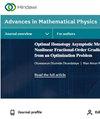An Improved Boundary Element Method for Predicting Half-Space Scattered Noise Combined with Permeable Boundaries
IF 1.1
4区 物理与天体物理
Q3 PHYSICS, MATHEMATICAL
引用次数: 0
Abstract
The boundary element method is widely used in practical engineering problems, especially in the field of acoustics. For flow-induced noise, the main target of acoustic calculations is to solve the wave equation with the flow field information. However, the sound field distribution of noncompact structures in half-space is especially complex because of the strong scattering effect, while the object surface boundary integration often brings a large workload and generates numerical singularities. In this paper, an improved boundary element method for predicting the aeroacoustic noise of noncompact structures is proposed, which can consider the characteristic distribution of sound field induced by complex structures in half-space. The smooth permeable boundary surrounding the object is used as the integration boundary, while the scattering effect of the ground boundary is investigated by combining the mirror Green’s function method, and the numerical prediction of aeroacoustic noise is carried out for the dipole source and NACA0012 airfoil in half-space. Numerical results show that the far-field noise obtained by using the permeable surface is consistent with that obtained by integrating the direct object boundary under the influence of ground boundary scattering. The mirror image Green’s function method is able to finely capture the ground scattering effect, which has a significant effect on the sound field as the frequency increases.结合渗透边界预测半空间散射噪声的改进边界元方法
边界元法广泛应用于实际工程问题,尤其是声学领域。对于流动诱导噪声,声学计算的主要目标是利用流场信息求解波方程。然而,由于散射效应较强,半空间非紧凑结构的声场分布尤为复杂,而物体表面的边界积分往往带来较大的工作量并产生数值奇异性。本文提出了一种用于预测非紧凑结构气声噪声的改进边界元方法,该方法可以考虑复杂结构在半空间诱发的声场分布特征。以物体周围的光滑可渗透边界为积分边界,结合镜像格林函数法研究了地面边界的散射效应,并对偶极声源和 NACA0012 机翼在半空间中的气声噪声进行了数值预测。数值结果表明,在地面边界散射的影响下,利用渗透表面得到的远场噪声与直接物体边界积分得到的远场噪声是一致的。镜像格林函数法能够精细地捕捉地面散射效应,随着频率的增加,地面散射效应对声场有显著影响。
本文章由计算机程序翻译,如有差异,请以英文原文为准。
求助全文
约1分钟内获得全文
求助全文
来源期刊

Advances in Mathematical Physics
数学-应用数学
CiteScore
2.40
自引率
8.30%
发文量
151
审稿时长
>12 weeks
期刊介绍:
Advances in Mathematical Physics publishes papers that seek to understand mathematical basis of physical phenomena, and solve problems in physics via mathematical approaches. The journal welcomes submissions from mathematical physicists, theoretical physicists, and mathematicians alike.
As well as original research, Advances in Mathematical Physics also publishes focused review articles that examine the state of the art, identify emerging trends, and suggest future directions for developing fields.
 求助内容:
求助内容: 应助结果提醒方式:
应助结果提醒方式:


